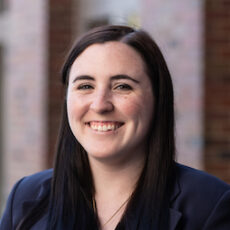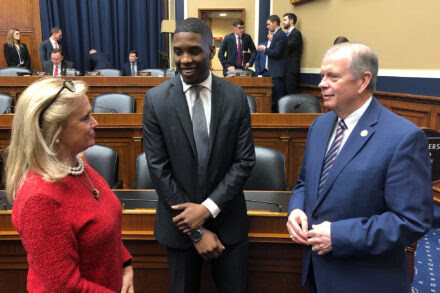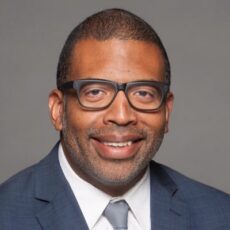
Kathleen Clancey
SummerWorks Program Manager, Poverty Solutions Economic Mobility Fellow
kchurley@umich.edu
Joshua Edmonds (center), the city of Detroit’s then director of digital inclusion and former digital inclusion policy fellow with Poverty Solutions at U-M, talks with U.S. Reps. Debbie Dingell, D-Dearborn, and Tim Walberg, R-Tipton, at a hearing before the Communications and Technology Subcommittee of the House Energy and Commerce Committee on Wednesday, Jan. 29. 2020. (Photo by Mike Waring, Washington Office)
Each day, government officials and community-based organizations administer programs and implement policies designed to improve the lives of families and individuals with low incomes. They possess the leadership and strategic vision to tackle complex issues, but sometimes find themselves constrained by the demands of day-to-day work and the need to address immediate crises.
The Poverty Solutions Economic Mobility Fellows program is designed to help our partners tackle long-term strategic objectives and analyze critical policy questions that they might otherwise not be able to pursue. Over the course of two years, fellows take on strategic economic mobility objectives, informing programs and policies through the use of coalition building, action-based research, and data analysis. The fellows not only address a critical need for talent and capacity, but also offer access to the University of Michigan’s world-class scholars and technical resources, expanding the capacity of government and community organizations to help more individuals and families find a path to upward mobility.
Poverty Solutions launched its fellows program through our signature Partnership on Economic Mobility with the City of Detroit. There, fellows have tackled some of the city’s most pressing problems, from navigating the best ways to address homeless encampments to assessing home repair needs and reducing disparities in internet access.
Fellows are early career master’s level professionals who serve two-year full-time appointments. They are a part of the Poverty Solutions team at the University of Michigan, but their day-to-day work is directed by leaders within the partner government or community organization office.
Fellows work on strategic initiatives that require expertise in research, data, and policy analysis. Fellows also receive guidance and mentorship from University of Michigan faculty and staff. Their work has been instrumental to policy and program change related to housing stability, digital inclusion, and homelessness supports.
Poverty Solutions works closely with each fellow to support their success, identify professional opportunities for advancement, and leverage data and research to inform policy and program change. Fellows become part of a broad network of community partners, faculty, staff and students, and have access to U-M’s research and data infrastructure.

“Working in city government, you’re always in need of more policy staff — people who can work with data, evaluate and inform city initiatives, and bring to bear evidence-based practice. Poverty Solutions dramatically increases our capacity in this area and is as focused on results as we are, and that’s rare to find in an academic partner.”

“In Detroit, we have developed public-private partnerships without any government funding, but it is an unsustainable model. We need federal resources to continue our work. If we were to receive additional funding, we could do more robust outreach, and incentivize more localized funding from philanthropic organizations.”

“At the city, I leveraged the resources and support of Poverty Solutions to increase the department’s ability to secure safe, affordable, and high-quality housing for low-income residents. It was wonderful to have the support of faculty and staff to help provide thought leadership around solving some of Detroit’s most pressing issues.”

SummerWorks Program Manager, Poverty Solutions Economic Mobility Fellow
kchurley@umich.edu
Community Projects Fellow
whitedea@umich.edu